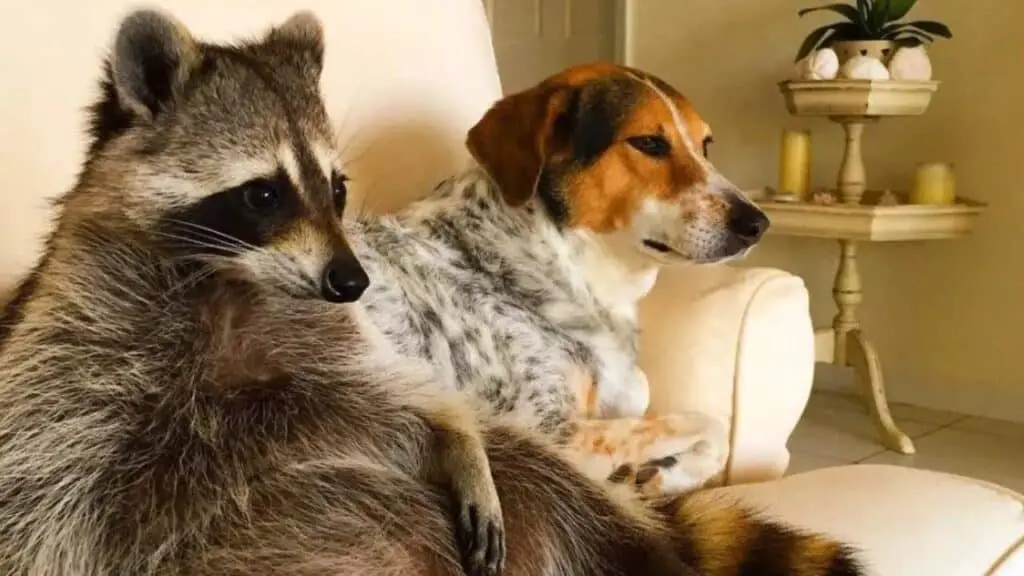Unlocking the world of raccoon adoption can be an intriguing yet complex endeavor.
Before embarking on this unique journey, it’s crucial to equip yourself with knowledge and insights that will pave the way for a harmonious partnership between you and your prospective raccoon companion.
In this guide, we’ll delve into “Ten Essential Pre-Adoption Insights for Pet Raccoon Enthusiasts,” offering essential information and considerations that will empower you to make informed decisions and provide the best possible care for your raccoon.
From legal considerations to behavioral insights, we’ll navigate the intricacies of raccoon adoption, ensuring that both you and your raccoon are poised for a fulfilling and enriching adventure together.
10 Pre-Adoption Pet Raccoon Adoption Insights

Before considering adopting a raccoon as a pet, it’s crucial to understand the following ten essential aspects:
1. Raccoons Are Wild Animals
Remarkably Intelligent, Yet Wild by Nature Raccoons are indeed intelligent creatures, renowned for their problem-solving abilities and impressive memory.
Nevertheless, it’s crucial to remember that they are inherently wild animals. Attempting to capture one from the wild is not only likely to be illegal but also unlikely to yield positive outcomes.
2. Legal Restrictions
Before welcoming a raccoon into your home, it’s essential to investigate the legal landscape.
Raccoons can ONLY be legally owned as pets in select U.S. states, including Arkansas, Delaware, Florida, Indiana, Michigan, Nebraska, Oklahoma, Rhode Island, South Carolina, Texas, West Virginia, Wisconsin, and Wyoming.
However, it’s important to note that specific states may demand a special permit or license for raccoon ownership. Always verify your state’s regulations before considering a raccoon as a pet.
3. Taming
The process of domesticating a raccoon starts from birth, requiring human intervention to serve as a surrogate mother.
This entails feeding them carefully prepared milk from a bottle and even providing gentle tummy massages.
These essential actions are vital, as without them, raccoons cannot naturally eliminate waste and may face life-threatening consequences.
4. Behavior
Raccoons are inherently assertive creatures and may perceive your house as their vast playground, freely roaming and using the property as they see fit.
Tamed raccoons can exhibit unpredictability and mischievous tendencies. Their natural inclination is to climb and explore, making them unsuitable for confinement in cages or cramped spaces.
5. Attention and care
Keeping pet raccoons demands a significant commitment, as they crave substantial attention and care.
Providing them with a suitable and stimulating environment, a well-balanced diet rich in essential nutrients, and acknowledging their intrinsic nature as undomesticated animals are all crucial aspects of responsible raccoon ownership.
6. Ethical Considerations
Owning pet raccoons comes with profound ethical considerations. It’s imperative to prioritize the well-being of the animal above your desire to possess one.
Experts advise spending time with raccoons through experiences such as wildlife rehabilitation or involvement with exotic veterinary practices to gain a genuine understanding of these creatures before considering them as pets.
7. Pet Raccoon Problems
Raccoons present substantial challenges when kept as pets, and managing them within your household can be demanding.
Their unpredictability poses a potential risk, as any escape could result in community issues and, in extreme cases, even lead to the euthanization of your pet due to the disturbance it may cause.
8. Financial Responsibility
When embarking on the journey of adoption, it’s vital to be fully cognizant of the financial commitment that it entails.
Beyond the initial adoption fees, your ongoing financial responsibility will encompass a spectrum of essential elements.
These encompass the cost of providing nutritious food tailored to their specific dietary needs, ensuring access to proper medical care, which includes vaccinations and regular check-ups, and accounting for miscellaneous expenses that may arise, such as grooming supplies and enrichment items for their well-being.
By comprehending the holistic financial obligations associated with pet ownership, you can better prepare for the fulfilling but substantial responsibilities that come with adopting a beloved companion into your life.
9. Hygiene
Raccoons are renowned for their intrinsic cleanliness and often exhibit grooming behaviors akin to cats.
Their meticulous self-care routines usually render them odor-free and well-groomed. In most cases, providing occasional baths using a mild shampoo is all that’s required to maintain their hygiene.
This quality makes raccoons relatively low-maintenance pets in terms of cleanliness, although it’s essential to remember their wild nature and the unique responsibilities associated with their care, as they cannot be fully domesticated.
10. Never Take a Raccoon from the Wild
Removing a raccoon from its natural habitat to raise as a pet is generally considered unlawful in the majority of jurisdictions.
Such regulations are put in place to protect both the raccoon population and the welfare of individual animals, as raccoons are wild creatures with specific care needs that can be difficult to meet in a domestic setting.
Therefore, it is essential to be fully informed about your local laws and ethical considerations before considering raccoon ownership, ensuring you provide the best possible care for these remarkable animals while adhering to legal requirements.

